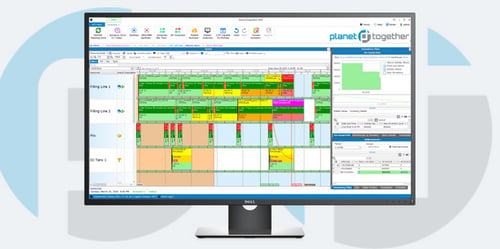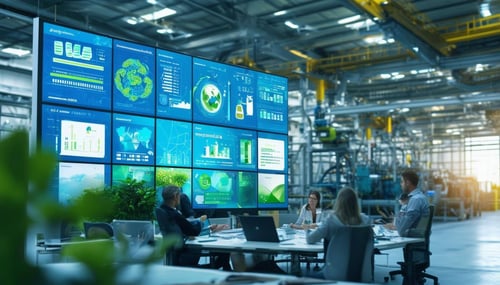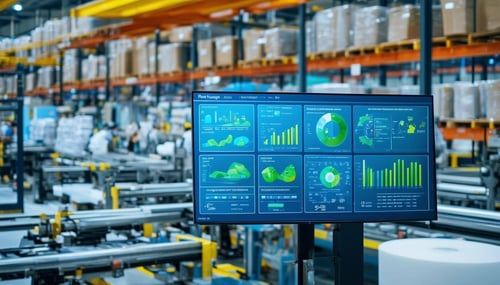Circular Economy Integration: How Production Planners Can Drive Sustainable Packaging with PlanetTogether & ERP Integration
The concept of the circular economy is gaining traction in packaging manufacturing as companies shift toward sustainability, waste reduction, and resource optimization. As a Production Planner in a packaging manufacturing facility, you play a crucial role in making circular economy principles work at the operational level.
But how can you seamlessly integrate circular economy goals into daily planning without compromising efficiency? The answer lies in smart integration between PlanetTogether and leading ERP systems such as SAP, Oracle, Microsoft, Kinaxis, and Aveva.
This blog explores how digitally connected planning solutions can help you balance sustainable production goals, resource availability, and real-world scheduling constraints.
The Challenge: Circular Economy in Packaging Production
A circular economy aims to eliminate waste and maximize resource efficiency by designing products and processes for reuse, recycling, or composting. For packaging manufacturers, this means:
Using recycled materials in production
Reducing scrap, defects, and overproduction
Optimizing material loops to keep packaging in circulation
Aligning production schedules with sustainability goals
As a Production Planner, you are at the center of these challenges, balancing material availability, production efficiency, customer deadlines, and regulatory requirements.
This is where an advanced planning and scheduling (APS) system like PlanetTogether—integrated with your ERP—becomes a game-changer.

How PlanetTogether & ERP Integration Enables Circular Economy Planning
By integrating PlanetTogether APS with SAP, Oracle, Microsoft, Kinaxis, or Aveva, you can synchronize your scheduling with sustainability objectives. This allows you to:
Optimize Material Usage with Real-Time Visibility
Integration enables real-time tracking of recycled vs. virgin material availability.
PlanetTogether can prioritize production runs that utilize post-consumer recycled (PCR) materials to align with sustainability targets.
Connected data ensures accurate inventory projections for recycled raw materials, reducing excess stockpiling or shortages.
Reduce Waste with Smarter Production Scheduling
APS integration helps minimize changeover waste by grouping jobs based on material type and reducing purging cycles.
PlanetTogether can schedule production sequences that limit scrap generation by optimizing machine efficiency.
ERP-APS integration provides insights into defect rates, helping planners identify and adjust processes to minimize losses.
Enable Closed-Loop Production Planning
Real-time data from ERP systems (like SAP or Oracle) ensures synchronization between production scheduling and reverse logistics.
You can plan production based on incoming reclaimed packaging materials, ensuring a steady flow of recyclables.
Integration allows tracking of material recovery rates, helping you adjust schedules dynamically to keep up with sustainable material inflows.
Align with Customer and Regulatory Demands
Automated scheduling ensures compliance with eco-labeling requirements, lightweighting strategies, and regulatory mandates.
Production planning tools can prioritize eco-friendly product lines to meet increasing customer demand for sustainable packaging.
ERP-APS data sync ensures planners have up-to-date insights into carbon footprint data, allowing better decision-making.
Improve Supply Chain Collaboration for Sustainable Packaging
Integration between PlanetTogether and supply chain platforms like Kinaxis or Aveva enables seamless coordination with suppliers and recyclers.
Planners can ensure raw material replenishment is aligned with sustainability commitments, such as using FSC-certified paper or bio-based plastics.
Real-time insights help adjust production plans based on recycled content availability and fluctuating demand trends.

Real-World Use Case: Circular Economy in Action
Scenario: A Packaging Manufacturer Adopting Recycled Materials
A global packaging manufacturer aims to transition 30% of its plastic packaging to post-consumer recycled (PCR) material by 2030. However, fluctuating availability of recycled plastic creates challenges in forecasting and scheduling production runs.
Solution: PlanetTogether + SAP Integration
By integrating PlanetTogether APS with SAP, the company achieves:
✅ Material Availability Forecasting – The system automatically updates production plans based on real-time recycled material stock levels.
✅ Automated Production Scheduling – PlanetTogether dynamically adjusts schedules to prioritize PCR material usage, minimizing disruptions.
✅ Waste Reduction – APS-driven batch optimization reduces excess scrap and limits overuse of virgin materials.
✅ Regulatory Compliance Tracking – Integrated reporting tools provide insights into carbon footprint, recycled content percentage, and compliance with sustainability laws.
As a result, the company increased recycled material usage by 20%, reduced production waste by 15%, and improved on-time deliveries of sustainable packaging.
Next Steps: Making Circular Economy Work for Your Facility
As a Production Planner in packaging manufacturing, integrating PlanetTogether with SAP, Oracle, Microsoft, Kinaxis, or Aveva allows you to:
🔹 Optimize material usage to reduce virgin resource dependency.
🔹 Improve production efficiency with real-time APS-driven scheduling.
🔹 Reduce waste and defects, aligning with circular economy goals.
🔹 Strengthen supply chain collaboration for sustainable raw materials.
🔹 Enhance compliance and reporting for sustainability metrics.
Getting Started
To unlock the benefits of circular economy-driven production planning, consider:
✅ Assessing your current production planning system – How well does it support sustainable packaging initiatives?
✅ Exploring APS-ERP integration options – How can your existing SAP, Oracle, or Microsoft system be enhanced with PlanetTogether?
✅ Piloting sustainability-focused scheduling – Test-run APS-driven production sequences that prioritize recycled material usage.
✅ Collaborating with suppliers and recyclers – Strengthen coordination for a steady supply of circular raw materials.
By integrating PlanetTogether with your ERP, you gain unprecedented control over sustainable packaging production, ensuring efficiency, profitability, and environmental responsibility.
In the packaging industry, circular economy principles aren’t just an option—they’re a requisite. As a Production Planner, you are at the forefront of driving operational efficiency while meeting sustainability commitments.
By leveraging PlanetTogether APS-ERP integration, you can make sustainable production scalable, cost-effective, and data-driven.
Are you ready to integrate circular economy strategies into your production planning? Reach out to explore how PlanetTogether and ERP integration can make it happen!
Topics: Real-time Visibility, PlanetTogether Software, Integrating PlanetTogether, Supply Chain Collaboration, Closed-Loop Planning, Packaging Manufacturing, Sustainable Packaging, Optimizing Material Usage





















LEAVE A COMMENT